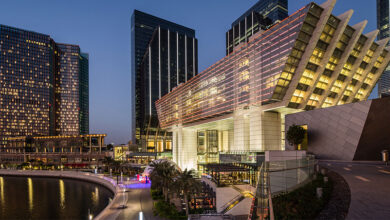
Is the metaverse hype fading, or is it an ongoing project yet to reach its peak?
There’s no denying the significant global investment pouring into the metaverse, as indicated in a report by Strategy& Middle East, a part of the PwC network. In fact, the total value of the metaverse is expected to approach $800 billion worldwide by 2024, with Gulf Cooperation Council (GCC) countries actively participating in this growing trend.
In July 2022, Dubai unveiled its metaverse strategy, marking a new step towards establishing itself as a leading metaverse economy. The strategy aims to boost Dubai’s economy by $4 billion and generate 40,000 new jobs over the next five years. Furthermore, the United Arab Emirates (UAE) has spearheaded the region’s metaverse innovation by launching the Middle East’s first metaverse incubator, focusing on nurturing early-stage metaverse and Web3 applications.
Saudi Arabia‘s ambitious NEOM project, a $500 billion city development, incorporates a metaverse component that is already shaping the city’s construction process. By providing architects, engineers, and designers with virtual collaboration tools, NEOM aims to customize aspects of the project for real estate clients, thereby leveraging the metaverse’s potential for enhanced project management and client engagement.
Overall, the PwC report estimates that the metaverse will inject $15 billion into GCC economies by 2030. This projection encompasses various sectors, including travel and tourism, financial services, and real estate, among others.
Energizing Established Sectors
- Travel and Tourism: The travel and tourism sector stands to gain significantly from the metaverse, with an estimated $3.2 billion economic boost projected throughout the GCC by 2030. Leveraging immersive virtual experiences, destinations like Saudi Arabia’s historic AlUla and the planned entertainment city Qiddiya aim to attract visitors by offering virtual tours and immersive entertainment facilities.
- Financial Services: The GCC’s banking and financial services sector could see a $1.8 billion value creation from the metaverse by 2030. With the UAE leading in fintech innovation and planning to introduce digital currency, blockchain technology and cryptocurrencies will most likely play a pivotal role in facilitating metaverse transactions, driving innovation in lending and payment systems.
- Real Estate: The metaverse is expected to add $1 billion to the GCC real estate sector by 2030, with projects like NEOM embracing virtual representations to redefine customer experiences. NEOM’s XVRS, a virtual metaverse enabling virtual exploration of the city, showcases the potential for immersive experiences to enhance real estate development and client interactions.
Seizing the Metaverse Opportunity
The PwC report also outlines six key strategies for organizations to formulate a successful metaverse strategy:
- Imagine the possibilities: Organizations should envision immersive experiences that highlight their offerings’ value and instill confidence among customers.
- Identify relevant business use cases: Companies must strategically select pilot projects aligned with their business model and purpose to experiment with metaverse applications.
- Build a robust digital infrastructure: Establishing scalable digital operations is essential for developing and delivering metaverse experiences that demand substantial computing power and cloud capability.
- Get on the ball with blockchain: Understanding and investing in blockchain technology is crucial for ensuring secure and transparent transactions within the metaverse.
- Get smarter about data: Enhancing data analytics and management capabilities is vital for harnessing the vast amounts of data generated in the metaverse to drive insights and decision-making.
- Make cybersecurity a priority: Embedding cybersecurity across operations is essential to safeguard customer information and ensure trust in metaverse environments.
While the path to realizing the full potential of the metaverse may pose challenges, GCC governments and companies are actively embracing this frontier.
As regulatory frameworks evolve and technological advancements continue, the promise of value creation in the metaverse is ready to grow, shaping the future of economies and industries across the GCC region.





